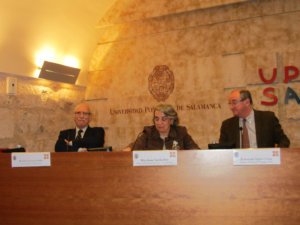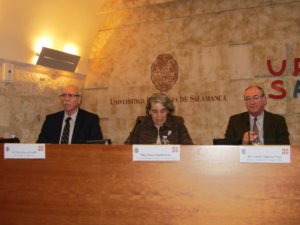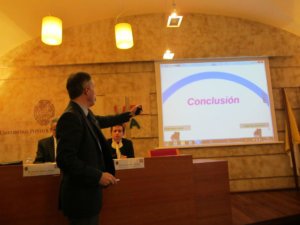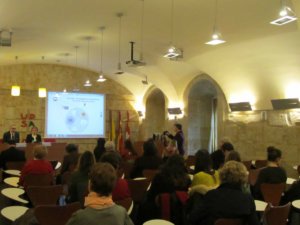The Fernando Rielo Chair at the Pontifical University of Salamanca, Spain on March 9, 2018 organized a day-long session devoted to “The Current Value of Metaphysics: Person, Science, and Health,” structured into several roundtables on metaphysics and theology, ethics and science, and health care as a market.
The Vice Rector for International Relations and the University Community, Jacinto Núñez Regodón; José María López Sevillano, President of the Idente School (Idente Foundation for Study and Research); and Antonio Sánchez Cabaco, the Director of the Chair, took part in the opening ceremony.
The Vice Rector expressed his gratitude for the confidence the Idente Foundation had accorded the Pontifical University: “The University has a debt of gratitude towards the Idente Foundation for supporting this Chair within our institution. The Chair seeks to keep the memory of Fernando Rielo alive and render fruitful a recognition of his concern for the scope of metaphysics.”
The President of the Idente School delivered the opening address on “The Contemporary Value of Metaphysics Observed in the Seven World Conferences since 2000.” According to López Sevillano, “metaphysics performs a healing function, involving balance for human society and its thought.” He asked, “In this time of advances, can we contribute to real progress in living out and conceiving metaphysics?” And he stressed that “there is no reason to fear the word ‘metaphysics,’ for it defines the supreme science.”
In the view of López Sevillano, “without metaphysics everything is left drifting, since metaphysics puts sciences in their place: it compares them and denounces their reductionism, manipulation, self-interest, and corruption….” The problem, he stated, lies in “human beings’ way of seeing metaphysics. The intellectual world does not look upon it favorably…. Metaphysics enjoys good health, but for ‘weak thought’ it is dead.” And he asserted that human experience cannot be reduced solely to the experimental domain “because it would be reduced to the sphere of ideologies, which provoke reductionism, exclusivism, and intransigence.”
López Sevillano also explained that metaphysics, if seeking to be authentic, must have a “well-formed” vision of reality and, as Fernando Rielo affirmed, should embody four properties: humility, “as opposed to selfishness”; truth, “as opposed to lies”; goodness, “as opposed to evil”; and beauty, “as opposed to a lack of sensitivity.” In the course of his remarks, he also referred to the next World Conference on Metaphysics, to be held at the Pontifical University of Salamanca, October 24-27, 2018, which will present a vision of metaphysics that is “thriving, creative, and stimulating for life, science, and culture, starting from the universal human vocation, reflection, and the search for meaning.”
The session continued with a roundtable discussion, “Concerning Metaphysics and Theology”—coordinated by Juana Sánchez Venegas, Associate Professor at the Universidad Autónoma de Madrid and Director of the Fernando Rielo Foundation’s Lecture Series—which featured Pablo García Castillo, Professor of Philosophy at the University of Salamanca, who spoke on “Metaphysics in the Salamanca School,” highlighting this school’s major contributions to metaphysics, along with theology, law, and economics. A central insight, for Professor García Castillo, was the distinction between essence and existence, and he dwelt at length on Duns Scotus’ formal distinction and Suarez’s modal interpretation.
The other speaker at this roundtable was Professor Gonzalo Tejerina Arias, Dean of the Theology Faculty at the Pontifical University, who considered “The Inescapable Presence of Philosophy in Christian Theology” and the way this relation had appeared, initially through a clear distinction between philosophy and theology. The latter starts from revelation, and the former, from reasoning, but both seek to establish truth. He cited the great theologian Rahner, who stated that “philosophy belongs to the very essence of theology,” for faith needs the intellectual capacity of reason.
After an animated discussion and a short break, another roundtable began on “Science at the Service of the Person: From Professional Psychoethics to the Community Ethics of Health Care,” coordinated by the new Director of the Fernando Rielo Chair, Antonio Sánchez Cabaco, Professor of Psychology at the Pontifical University of Salamanca, acting for the first time in this role at a public event.
The first speaker was José Antonio Mirón Canelo, Associate Professor at the University of Salamanca Medical School, who dealt with “Inclusive Science and Health Care,” considering the need for research to achieve a quality of life in health care which avoids conflicts of interest while attaching value to truth and including persons and stressing that there should be no division between the social and healthcare dimensions. He advocated a twenty-first century medicine which would be more personalized, preventive, predictive, and informed.
The final speaker, Teresa Sánchez Sánchez, Associate Professor at the Pontifical University’s Psychology Faculty, dealt with “Health Care as a Market: Ethical Reflections on Overdiagnosis and the Ideal of Perfect Health,” pointing to the anthropological model underlying the fragmented, hypermodern human state, with its identity crisis, fluid thought, dissatisfaction with temporal achievements, excessive input of information, and ephemeral relations, among other factors.
She emphasized that we have moved from the “value of health” to “health as a value” (listed on the stock market, rendered a quasi-religion), affirming that, since we seek such perfect health, any disturbance is regarded as a pathology and there is an endless list of neo-illnesses. She concluded that we are losing sight of persons and must give priority to listening to them.
After another animated discussion, Antonio Sánchez Cabaco, Director of the Fernando Rielo Chair, concluded the session with words of thanks to all participating and invited them to attend the Seventh World Conference on Metaphysics, October 24-27, 2018, supported by the Chair.




















